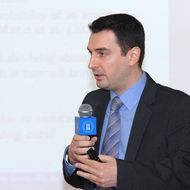- A
- A
- A
- ABC
- ABC
- ABC
- А
- А
- А
- А
- А
- HSE University
- Faculty of Economic Sciences
- Department of Theoretical Economics
- Events
- Department of Theoretical Economics Research Seminar with Mariya Teteryathikova
-
Department
109028, Moscow,
Pokrovsky Boulevard 11, Rooms: S1029, S1030
Phone: +7 (495) 772-95-90*27172, 27174, 27601, 28270
The Department of Theoretical Economics brings together highly qualified specialists in various fields of economics, including micro and macroeconomics, monetary and financial theory, economic history and the history of economic thought. Our mission is to teach economic disciplines at HSE on the level of leading Western universities.
Karpov A. V., Markström K., Riis S. et al.
Discrete Applied Mathematics. 2025. Vol. 370. P. 57-70.
In bk.: Human-Centric Decision and Negotiation Support for Societal Transitions: 24th International Conference on Group Decision and Negotiation, GDN 2024, Porto, Portugal, June 3–5, 2024, Proceedings. Cham: Springer, 2024. P. 102-113.
Andreyanov P., Krasikov I., Suzdaltsev A.
arxiv.org. Theoretical Economics. Cornell University, 2024
109028, Moscow,
Pokrovsky Boulevard 11, Rooms: S1029, S1030
Phone: +7 (495) 772-95-90*27172, 27174, 27601, 28270

Department of Theoretical Economics Research Seminar with Mariya Teteryathikova
Dear colleagues,
Department of Theoretical Economics invites you to attend the research seminar with Associate Professor Mariya Teteryatnikova, HSE
Date: October 3, 2023
Time: 1:00 p.m.
Working language: English
Speaker: Mariya Teteryatnikova, Associate Professor of the Department of Theoretical Economics
·
The link to MS Teams: Click here to join the meeting
ID: 338 598 102 924
Access code: LfS47F
Title: "Support Networks in Contests", joint with Anastasia Antsygina
Abstract: We study the incentives for formation of support networks among three heterogeneous agents in view of potential future conflict. With a positive probability, each agent engages in a contest game, which we model as an all-pay auction, against one of the other agents. Before the contest, the agents can create links with each other that will provide support in the contest and thus, determine agents’ competitive strengths. Forming a link is costly but results in direct and indirect benefits. The direct benefits realize when the player enters into a competition himself and receives support from the connections that were formed, while the indirect benefits occur when the player does not compete himself but derives utility from his connection's success in the competition. We show that a pairwise stable network always exists, and the introduction of indirect benefits has a non-trivial effect on the resulting network structure. In particular, a network with two or more links is pairwise stable if and only if indirect benefits are large enough. Finally, a pairwise stable network is generally inefficient and can display either underinvest or overinvest in the links.
- About
- About
- Key Figures & Facts
- Sustainability at HSE University
- Faculties & Departments
- International Partnerships
- Faculty & Staff
- HSE Buildings
- Public Enquiries
- Studies
- Admissions
- Programme Catalogue
- Undergraduate
- Graduate
- Exchange Programmes
- Summer Schools
- Semester in Moscow
- Business Internship
-
https://elearning.hse.ru/en/mooc/
Massive Open Online Courses
-
https://www.hse.ru/en/visual/
HSE Site for the Visually Impaired
-
http://5top100.com/
Russian Academic Excellence Project 5-100
- © HSE University 1993–2025 Contacts Copyright Privacy Policy Site Map
- Edit






